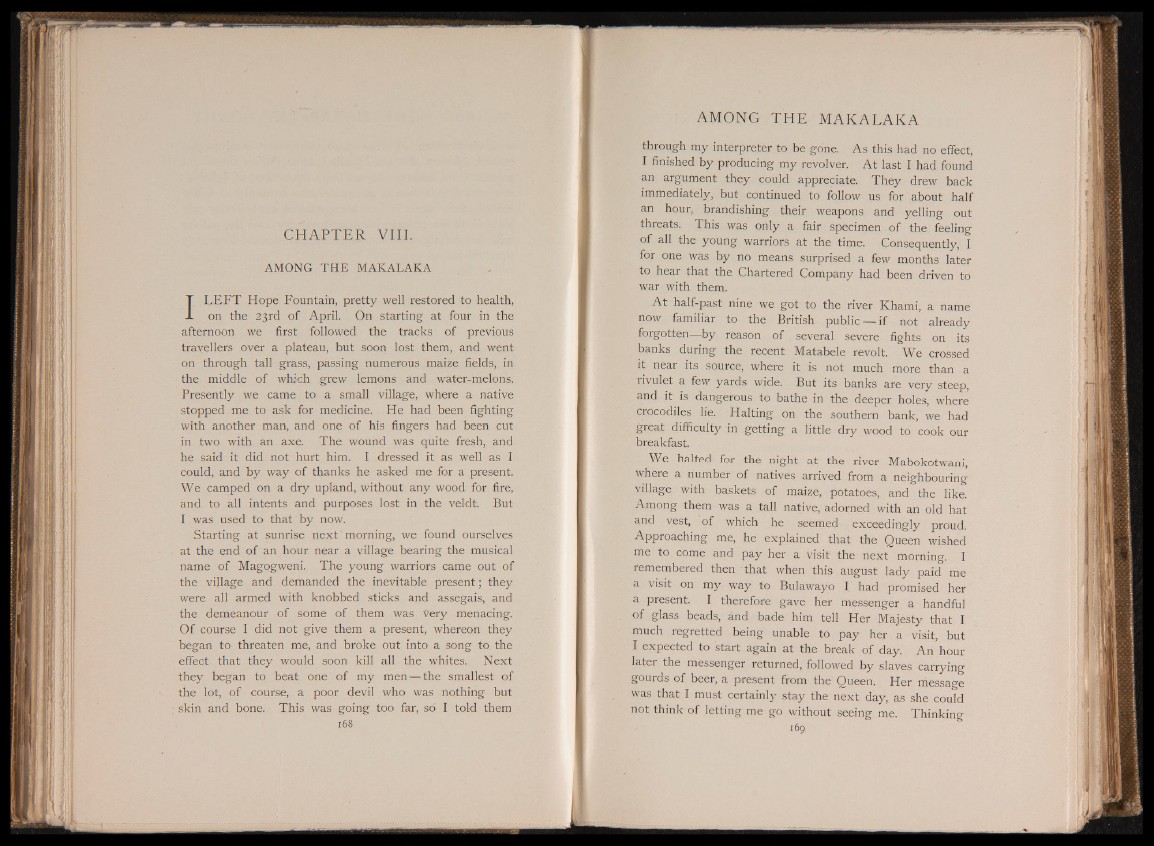
C H A P T E R VI I I .
AMONG THE MAKALAKA
I L E F T Hope Fountain, pretty well restored to health,
on the 23 rd of April. On starting at four in the
afternoon we first followed the tracks of previous
travellers over a plateau, but soon lost them, and went
on through tall grass, passing numerous maize fields, in
the middle of which grew lemons and water-melons.
Presently we came to a small village, where a native
stopped me to ask for medicine. He had been fighting
with another man, and one of his fingers had been cut
in two with an axe. The wound was quite fresh, and
he said it did not hurt him. I dressed it as well as I
could, and by way of thanks he asked me for a present.
We camped on a dry upland, without any wood for fire,
and to all intents and purposes lost in the veldt. But
I was used to that by now.
Starting at sunrise next' morning, we found ourselves
at the end of an hour near a village bearing the musical
name of Magogweni. The young warriors came out of
the village and demanded the inevitable present; they
were all armed with knobbed sticks and assegais, and
the demeanour of some of them was very menacing.
Of course I did not give them a present, whereon they
began to threaten me, and broke out into a song to the
effect that they would soon kill all the whites. Next
they began to beat one of my men.#- the smallest of
the lot, of course, a poor devil who was nothing but
skin and bone. This was going too far, so I told them
168
AMON G THE. M A K A L A K A
through my interpreter to be gone. As this had no effect,
I finished by producing my revolver. At last I had found
an argument they could appreciate. They drew back
immediately, but continued to follow us for about half
an hour, brandishing their weapons and yelling out
threats. This was only a fair specimen of the feeling
of all the young warriors at the time. Consequently, I
for one was by no means surprised a few months later
to hear that the Chartered Company had been driven to
war with them.
At half-past nine we got to the river Khami, a name
now familiar to the British public — if not already
forgotten by reason of several severe fights on its
banks during the recent Matabele revolt. We crossed
it near its source, where it is not much more than a
rivulet a few yards wide. But its banks are very steep,
and it is dangerous to bathe in the deeper holes, where
crocodiles lie. Halting on the southern bank, we had
great difficulty in getting a little dry wood to cook our
breakfast.
We halted for the night at the river Mabokotwani,
where a number of natives arrived from a neighbouring
village with baskets of maize, potatoes, and the like.
Among them was a tall native, adorned with an old hat
and vest, of which he seemed exceedingly proud.
Approaching me, he explained that the Queen wished
me to come and pay her a visit the next morning. I
remembered then that when this august lady paid me
a visit on my way to Bulawayo I had promised her
a present. I therefore gave her messenger a handful
of glass beads, and bade him tell Her Majesty that I
much regretted being unable to pay her a visit, but
I expected to start again at the break of day. An hour
later the messenger returned, followed by slaves carrying
gourds of beer, a present from the Queen. Her message
was that I must certainly stay the next day, as she could
not think of letting me go without seeing me. Thinking
169